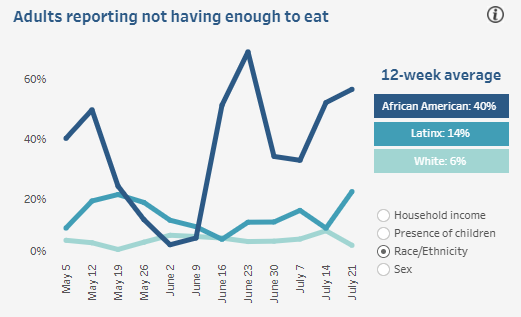Since the start of the COVID-19 pandemic, the federal government has made several changes to its food assistance programs to keep kids healthy during the national emergency. The changes allow states to maximize the reach of existing food safety nets, while benefiting from additional federal funds. With unprecedented levels of unemployment and food insecurity, Nebraska must take advantage of every dollar available to help struggling Nebraskans.
Black, Latinx, and low-income Nebraskans at greatest risk for food insecurity
Since July, we have published data to show how the pandemic has affected the lives of Nebraskans in the COVID-19 Data Hub. Most of the post-pandemic data are collected from the U.S. Census Bureau’s new Household Pulse Survey, which has surveyed American adults near-continuously since early May.

By every measure, we see that the pandemic has intensified disparities for Black and brown Nebraskans, and for families with low incomes. 40% of Black Nebraskans and 14% of Latinx Nebraskans reported not having enough food to eat, compared to 6% of white Nebraskans; and 21% of Nebraskans with an annual household income of less than $35,000 reported not having enough food to eat, compared to 3% of those earning more than $50,000.
Food assistance programs help struggling children, boosts local economies
Food pantries have been reported overwhelming increases in demand since the start of the pandemic, while the number of households enrolled in the Supplemental Nutrition Assistance Program (SNAP), increased by 11% from March to May. Without significant public investment, charitable food nets will be unable to keep up with needs. Early on in the pandemic, the state of Nebraska joined states across the country in taking advantage of much-needed flexibilities in federal food assistance programs.
Supplemental Nutrition Assistance Program (SNAP) Emergency Allotments (EA)
The federal government is temporarily allowing states to increase benefits to SNAP recipients through Emergency Allotments (EA). Under normal circumstances, families receive SNAP benefits on a sliding scale, up to a maximum amount. Families with lower incomes receive a higher benefit.
From March through July, the Nebraska Department of Health and Human Services (DHHS), like states all across the country, applied for and received approval to provide the maximum benefit amount to all SNAP recipients. This change benefits low-income families, while also reducing administrative burden, since case workers no longer have to calculate benefit amounts for each family based on their income. In July, 39,645 Nebraska families benefited from Emergency Allotments (EA), injecting over $7.1 million in federal funds into local grocery stores.
Pandemic Electronic Benefit Transfer (P-EBT) Program
With widespread school closures, many children who would otherwise receive low or no-cost school meals are missing out on meals. Congress authorized the Pandemic Electronic Benefit Transfer (P-EBT) program to provide food assistance to families missing out on free or reduced-price school meals due to school closures. To be eligible, children must have experienced at least five consecutive days of school closures.
In June, Nebraska received approval for its P-EBT application for spring semester closures. Families were eligible for up to $281 in SNAP benefits. Families were eligible if their children received free or reduced-price school meals, and fell into two categories:
- Families currently receiving SNAP benefits. These families automatically received P-EBT benefits along with their SNAP benefits, and did not need to apply.
- Families not currently receiving SNAP benefits. These families were required to apply for benefits between June 22-July 19. The application period was narrow, and many families reported issues with the process. As a result, only 85,000 children received P-EBT, out of an estimated 170,600 eligible children.
Earlier this month, DHHS announced that it would apply for a second round of P-EBT for fall semester closures, covering the months of August and September. This is a promising development, but Nebraska has not yet received federal approval, and application details are not available.
Call Governor Ricketts: Maximize federal pandemic food assistance programs for Nebraska children
Last month, Governor Ricketts announced that DHHS would be the only state in the country to stop participating in EA for the month of August. In addition, despite calls from advocates to re-open the P-EBT application to families who missed the deadline for spring semester school closures, DHHS has not re-opened thee application.

Turning away federal funds for food assistance programs will make a bad situation worse for thousands of Nebraska children who are struggling because of the pandemic. Three in four SNAP recipients in Nebraska are families with children. Families in rural parts of the state, in particular, rely on SNAP to keep food on the table.
Turning away federal funds for struggling families will slow our state’s economic recovery. Every $1.00 in SNAP benefits generates an additional $1.73 in economic activity. During an economic downturn, this stimulus benefits families, and flows through our entire food system, from local grocery stores, through the trucks that transport food, and to local farmers and producers. Assuming similar levels of SNAP participation from July, Nebraska is missing out on $12.3 million in local economic activity every month by not extending emergency allotments to SNAP recipients.
Contact Governor Ricketts today at 402-471-2244! Urge him to maximize federal pandemic food assistance for Nebraska children by:
- Re-opening the application period for the first round of P-EBT to allow as many as 85,600 Nebraska children to receive food assistance for meals missed due to school closures.
- Extending the Emergency Allotment to all SNAP recipients for the duration of the public health emergency.




Post a comment